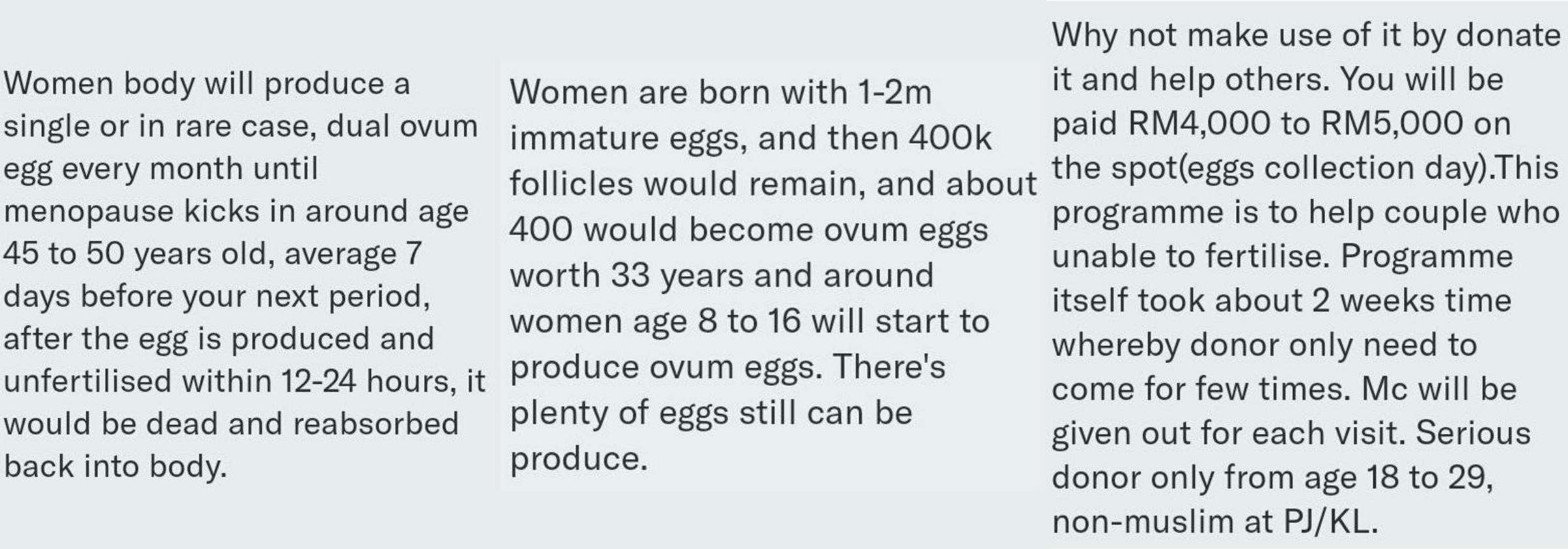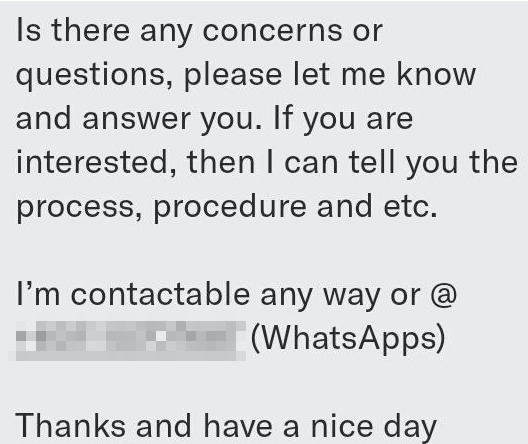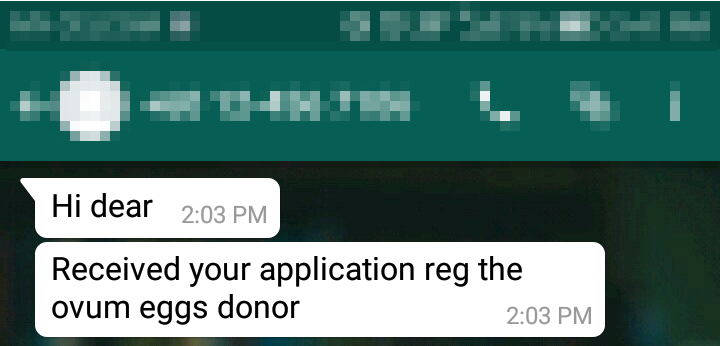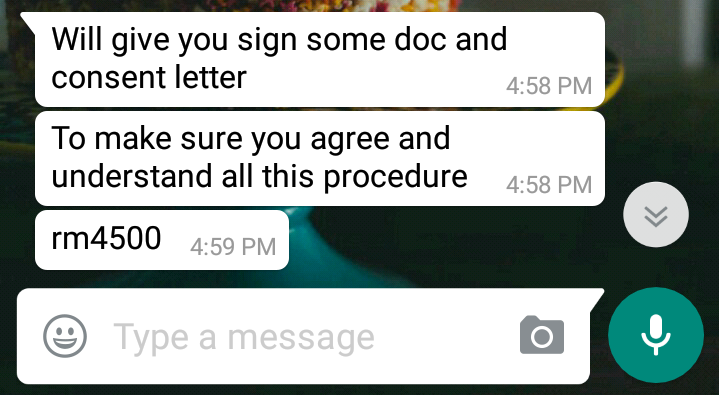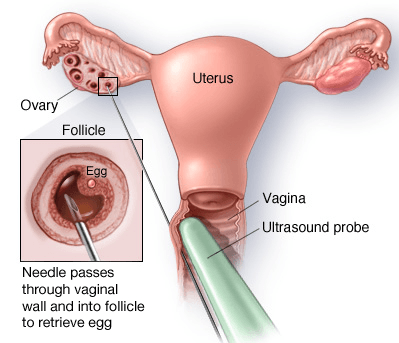What Happened When Someone Offered To Pay Me RM4,500 For My Ovum
Is it legal to sell your eggs in Malaysia?
A few months ago, I got a message on a dating app. I assure you, this article is not about my love life.
The first line of the message read, "Hi, we're looking for ovum eggs donor for IVF programme."
I certainly did not expect to read this when I saw the little green notification light up on my screen, but it definitely piqued my curiosity.
Here's what the whole message read:
David left a contact number and mentioned that we could discuss this further via WhatsApp if I was interested to sell my eggs for money
I've read about paid ovum donation in Malaysia and most of the information leads to the fact that it is a hush-hush industry, usually run by dubious agents who connect interested donors with medical facilities. It isn't something that is out in the open and that further flamed my curiosity.
I was shocked. I knew it was dodgy but I wanted to know how far this would go. Isn't it illegal for a woman to sell her eggs in Malaysia? I wanted more answers (all of which I researched later on and is written in detail in this story) so I probed him further.
I dropped the guy a text on WhatsApp and told him I was interested. His response was immediate. David told me that he will collect my biodata and submit it to the doctors through his "colleague".
These are all the information that an interested donor must provide in order for her to be registered in their system:
1. Full name
2. Date of birth
3. Blood group
4. Race
5. Nationality
6. Religion
7. Height
8. Weight
9. Eye colour
10. Body type
11. Education level
12. What are you working as?
13. Relationship status
14. If married, how many children?
15. Hobbies
16. Any family medical history?
17. Have you gone through any kind of surgery before?
18. Any allergy to food or medication?
19. Have you ever registered as an ovum donor before?
20. Thalassemia α & β?
21. HIV?
22. Hepatitis B & C?
23. Chlamydia?
24. Gonorrhea?
25. HTLV 1 & 2?
26. Respiratory
27. Cardiovascular disease?
28. Diabetes?
29. Epilepsy/Mental disorder?
30. Do you smoke? If yes, what is the frequency?
31. Next period date
32. Duration of period?
33. Period cycle (Example; 28-32 days)
He had also requested for three, professional photos of myself with no glasses or items that cover my face.
Before I continue, let's go through some details about the traits of an egg donor. Every parent wants the perfect child - intelligent, good looking, and healthy.
In their search for the "golden egg", intended parents usually seek egg donors that resemble them the most or fit in seamlessly into their family. However, over the years, couples have become more particular about egg donor traits.
The request can be as specific as an eurasian, brown-eyed, athletic, tall egg donor with an IQ of at least 120. Alternatively, they may choose someone who looks like them, is of the same race, culture and is also beautiful/handsome and intelligent. It all comes down to how they want their future child to be like.
Typically, intended parents would submit their desired physical characteristics to medical facilities along with their photos and their case managers would help them find the most suitable egg donor.
So, the information that David had requested from me would help recipient of egg donors determine if I would be a suitable match to what they're looking for
Once I've submitted the information, he told me he would register my information at all the centres and when there's someone who is interested in my profile, his "colleague" will get in touch with me to start the procedure.
He did mention that the highest demand at the moment is for people of Chinese descent and of the AB+ blood group.
Just a week later, David's colleague, Joanna, got in touch with me. She told me that there was an interested party and that they would like to start me up on the egg donation process right away.
She gave me the lowdown on how the process will be like.
Firstly, the donor will have to go for pelvic scans and an ultrasound and if everything checks out, the doctors will set another date for a blood test.
The blood test is followed by a counselling session on ovum donation that will only take about 10 to 15 minutes, according to Joanna. Once the donor gets her period, she will have to take self-administered hormone injections for about 14 days to stimulate the ovaries.
The donor will then be given another jab to ensure that her eggs are intact and will eventually be given the human chorionic gonadotropin (HCG) injection to mature and release the eggs.
The final part of the procedure is the extraction, whereby the donor will be anesthetised and the eggs will be extracted using a small ultrasound-guided needle.
She assured that an MC will be given for each hospital visit.
If I go through with the procedure, I would receive RM4,500 in payment
Joanna told me that she'll be giving me some forms and consent letters to be signed before we start with the ovum donation process.
Right about that same time, Nanyang Siang Pau, reported that Malaysian women are selling their eggs to buy branded bags and smartphones
According to the Chinese daily, these women have made between RM3,000 to RM8,000 through ovum donation.
Why did they do it? From wanting to settle their debts to satisfying their materialistic fantasies, the reasons vary.
In such turbulent times, it is only natural to jump at the opportunity of making some extra money in exchange for a few hospital visits and hormonal jabs.
Nanyang Siang Pau's report and my conversations with Joanna sparked a tonne of questions in me about egg donation in Malaysia.
Is it even legal to sell your eggs in Malaysia?
A lawyer we spoke to stressed that receiving "compensation" for donating eggs in Malaysia is considered illegal. You can, however, donate your eggs.
But here's the thing, there are no specific provisions in the law that states that. In late 2015, Deputy Director-General of Health (Medical) Datuk Dr Jeyaindran Sinnadurai told The Star that Malaysia will soon have a new law in place that covers all issues related to artificial reproduction.
The law will include in vitro fertilisation (IVF), surrogacy, and the donation and storage of human eggs and sperm.
The Artificial Reproduction and Tissue Act was supposed to be tabled in the Parliament in early 2016, but it has not been brought up to date
Dr Jeyaindran said that the law can address and give a clearer picture when issues like commercial trading of eggs and sperm arise.
Meanwhile, Malaysian Medical Association (MMA) president Dr Ashok Zachariah Philip said that the act will also shed light on surrogacy laws in Malaysia.
"Commercial surrogacy is not legal in Malaysia. But there is a grey area if a woman becomes a surrogate mother without any remuneration. Problems can also arise if the surrogate mother does not want to give up the baby," he explained.
Note that surrogacy is illegal for Muslims under the Syariah law in Malaysia. A fatwa was issued in 2008 banning surrogacy as a woman carrying a baby made from the sperm of a man she is not married to is similar to her having his baby out of wedlock. However, Muslims are allowed to go through IVF treatments, so long the sperm and egg belong to the married couple.
The situation is pretty much the same in Singapore, where donors cannot be paid for donating their eggs
A Singaporean Ministry of Health representative that spoke to Straits Times, said that "couples can reimburse the donor for expenses incurred in relation to the collection, storage or transport of egg as a result of the donation".
The report dated 5 February 2017, also revealed that more Singaporeans are opting to head to Malaysia, which has become the place for "cheaper and popular destination" for egg donation.
They also spoke to Christine Gautaman, who owns the Heart to Art egg donor agency in Selangor. Christine said that her agency charges RM45,000 for IVF procedures and that covers everything from the donor's "compensation" fee to implanting the embryos into the recipient.
The donors are not paid per se, but are given "an allowance for time off work", said Christine, but she did not specify how much the allowance would be.
Now, back to Joanna. A few days before my period was due, she called me multiple times to check up on me and I had told her that my period was late.
When I told Joanna that my period was late, she asked me to keep her updated and made it a point to assure me that I will be in safe hands throughout the process, but had refused to divulge any details on who will be conducting the egg donation medical procedures and where exactly it will take place at. "Don't worry, the doctors are all experienced one."
What's interesting is that she also mentioned during one of those phone calls that we will be skipping the counselling session. When I asked why, her response was merely, "It's okay la, no need. The doctor will explain to you."
A day later, I tried contacting her again to set an appointment to start the procedure, but she was unreachable and I realised that she may have blocked me.
I did, however, attempt to call her from a different number. She answered but claimed that I had gotten the wrong number and that she doesn't know what I'm talking about.
That was the last time we were in touch.
See, aside from a few fertility centers offering couples egg and sperm donation options for conception, there's not a lot of details on ovum donation in Malaysia
According to a forum called Malaysian Motherhood, egg donotion and IVF treatment here can cost up to RM40,000.
A user who was part of the discussion said that places like Tropicana Medical Centre (TMC) and Sunfert International Fertility Centre, charges around RM40,000 for both the IVF process and egg donor compensation, while Alpha Fertility Centre and Metro IVF Fertility Centre charges about RM25,000.
The user also mentioned that a major chunk of the fees goes to the donor's agent fees and the donor compensation. If the IVF candidate has her own donor, the fees will be cheaper, read the post.
When approached by these "agents" like David and Joanna, women are not exactly explained of all the possible side effects and consequences of being an egg donor
While egg donation isn't exactly the most dangerous medical procedure to go through in the world, it does come with multiple side effects and possible risks and complications.
The fertility medications used in the egg donation process can cause side effects such as moderate weight gain, mood changes, stomach pressure, headaches, and the Ovarian hyperstimulation syndrome (OHSS).
Some of the symptoms of OHSS are rapid weight gain, severe abdominal pain, persistent nausea and vomiting, blood clots in legs, decreased urination, shortness of breath, and tight or enlarged abdomen.
In rare cases, the ovary hyperstimulation syndrome can lead to development of fluid in the abdomen or lungs, kidney failure, or even stroke
In extremely rare cases, the enlarged hyperstimulated ovary can rupture. This will require a major surgery to be treated and the loss of one or both ovaries is possible.
The risk of getting OHSS may increase if donors choose to not undergo with the egg retrieval after taking the fertility medications.
There are also side effects and risks during the egg retrieval process. It can cause mild to moderate discomfort, cramping, and bloating for up to 10 days after the ultrasound guided egg retrieval. More rare but serious complications include bleeding, infection, and injury to the bowel or blood vessels.
Also, there is a chance of the donor becoming pregnant if the individual engages in unprotected sex during the egg donation cycle. This is because it is theoretically possible that not all the developed eggs will be recovered during the retrieval. Egg donors are usually advised to abstain from sex throughout the egg donation process.
The information above on egg donor side effects and risks was obtained from Egg Donor America.
These risks, coupled with the possible psychological distress that stems from the assisted reproductive technology procedure aren't usually part of egg donation advertisements
What screams from the ads are usually just how simple and quick the procedure is and how much money women can make from it.
The lack of available information and awareness about egg donation are why some women blindly walk into the procedure.
Now, imagine being a 20-something, struggling fresh graduate with student loan debts and piling bills. I can understand why women are starting to consider selling their eggs for quick cash.
With that said, the number of women trading their genes for money is increasing rapidly
According to an article on Women's Health, the Journal of American Medical Association found that the number of egg donors for IVF has increased at about 70% from the year 2000 to 2010.
Women do it for all sorts of reasons - for some, it's a way to make some extra cash and for others it could be the interest in helping other women conceive.
A group of women I spoke to said that if it comes down to it, money would be their biggest motivation to donate their ovum.
Ovum donation typically holds the promise of making a substantial amount of money in a short period of time, and the fact that it is described as a noble assistance for people that are unable to conceive, makes the idea even more desirable.
Unfortunately, this industry has been made use of by "agents", who see it as a way to entice young women to consider selling their eggs for lucrative cash "compensation".
All things considered, the issue comes down to the fact that the concept of egg donation is still shrouded in mystery in most Southeast Asian countries.
However, this is contrary to how it is in places like the US, where the concept of ovum donation is widely accepted and heavily discussed
In America, there are plenty of egg donor centres that interested donors can look into and seek information from if they are interested to be donors.
This is despite the fact that it is technically illegal for women to sell their eggs for money in all states in the US, except for New York, but they can be compensated for their time and effort.
The American Society of Reproductive Medicine's guidelines on how much an egg donor should be paid, states that, "Although there is no consensus on the precise payment that oocyte donors should receive, at this time sums of USD5,000 (about RM22,000) or more require justification and sums above USD10,000 (approximately RM44,000) go beyond what is appropriate."
This provision was removed recently following a lawsuit that challenged the egg fee guidelines established by the organisation more than a decade ago. The group of egg donors who filed the lawsuit, said that egg donation is "far more painful and risky" than sperm donation, but women are paid the same hourly rate as sperm donors.
The plaintiffs had argued that the compensation guideline was in place to avoid exploitation in the egg market but eventually agreed to a settlement and to remove the provisions in its guidelines about egg donor compensation.
So, the problem does not lie with egg donation in itself. It comes down to way it is practised and the laws surrounding assisted reproductive treatments.
Jennifer Lahl, founder of the Center for Bioethics and Culture produced a documentary titled, 'Eggsploitation: The Infertility Industry Has A Dirty Little Secret' a few years ago and it highlights how even in the most progressive countries, the multi-billion dollar industry is operating out of sight and women are still being exploited.
'Eggsploit' is defined as "to plunder, pillage, rob, despoil, fleece, and strip ruthlessly a young woman of her eggs, by means of fraud, coercion or deception, to be used selfishly for another’s gain, with a total lack of regard for the well-being of the donor".
Eggsploitation looks into two of the biggest issue with the egg donation industry, namely:
1. The way women are solicited to donate their eggs via advertisements without providing them with the detailed risks and information regarding egg donations.
2. There's hardly any follow up or research that goes into the egg donation industry despite its growing popularity. While it is rare, there are donors that have faced severe health complications from donating their eggs.
Ultimately, most of the concerns raised regarding ovum donation urges policy makers and the infertility industry to collect, research, and increase awareness on all information related to egg donation. This can help to protect women from any risky or destructive practices surrounding ovum donation.
In retrospect, the lack of clarity and legal safeguards may have driven these people in the infertility industry to operate underground.
This is precisely why it is time to push for the long-awaited Artificial Reproduction and Tissue Act to be tabled in the Parliament.
The law can serve as the much-needed legal pillar that can destigmatise egg donation and ensure that all parties involved in it are well protected.
However, as of now there's no word on when or if the act will be tabled in the Parliament.
